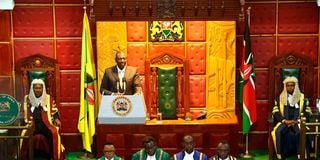Premium
Newfound freedom has lifted all boats, but also left a trail of dashed hopes

President William Ruto addresses the 13th Parliament on September 29, 2022. Azimio's collapse in Parliament should come as no surprise. It does not exist as a parliamentary party because it did not field a single candidate outside the presidential contest, which it lost.
What you need to know:
- Azimio was, by design, legally anomalous, structurally unstable and politically unsustainable.
- It was held together by its leader’s state power and nothing else. Thus, its shelf life was unequivocally inscribed, and it is no surprise that it is no more.
- Its collapse in Parliament should come as no surprise. Indeed, Azimio does not exist as a parliamentary party because it did not field a single candidate outside the presidential contest, which it lost.
Folk who have been titanic partisans of Azimio, and who have hitherto been considered tremendously clever, are displaying a poor grasp of civics.
Azimio was, by design, legally anomalous, structurally unstable and politically unsustainable.
The dynastic remedy to this woeful aggregation of fatal defects was to deploy state power and concomitant resources with unprecedented extravagance and desperate force.
It was held together by its leader’s state power and nothing else. Thus, its shelf life was unequivocally inscribed, and it is no surprise that it is no more.
Its collapse in Parliament should come as no surprise. Indeed, Azimio does not exist as a parliamentary party because it did not field a single candidate outside the presidential contest, which it lost.
Not one MP formally fights under its dreadful banner, and its putative delegation has reverted into Jubilee, ODM and the other usual suspects.
Unbearable anxiety
Talking of suspects, in its rampant heyday, Azimio galloped and stampeded roughshod over the institutional terrain, knocking the norms and expectations that constitute the ordinary off-kilter.
This strategic disruption of normalcy was aimed at creating a pervasive environment of unbearable anxiety, intense insecurity and overwhelming dread to manage political behaviour.
Those inside Azimio were mortally afraid of leaving, or of being suspected of any form of nonconformity.
Those outside it preferred to keep their heads down and mount effusive displays of performative neutrality, whilst those who dared compete with Azimio were inevitably radicalised into a state of perpetual siege.
“Freedom is Coming!” was recited with vociferous verve, simultaneously defiant and desperate.
When freedom came, formerly timorous Azimio inmates quickened in a snap and made a run for it, leaving behind, not even a shell, but a mere memory.
Violence lay at the heart of Azimio’s constitutive mechanism, and many of its members were not in it voluntarily.
This explains the awkward energy in Azimio: its lugubrious campaigns, hyper-regimented events, long-faced champions and the notable absence of all spontaneity in its activity.
It also explained why many politicians with a pending date with the DCI, DPP or the courts found it difficult to resist “invitations” to join the outfit. In my latest remarks on this monstrous political anomaly, ‘A coup, shifting gears and why Azimio is falling apart’, I observed: “In other words, with (President Kenyatta’s) presidential force close to nil, Azimio is not only immobile, but it is also falling apart.
By design, Azimio substituted Kenyatta’s presidential power for internal equilibrium.
Entities that had been impelled into Azimio by the threat of violent state power now enjoy illimitable political freedom.
Sans force, Azimio resumes its state of rest or motion at constant speed in a straight line: it is neither coming nor going”.
The advent of freedom is a tide that has lifted all boats, but not all have fared as well as they might have hoped. Many who were hiding in politics now have to reckon with their demons.
On the other hand, prosecutions that had been mounted on spurious grounds to leverage politicians away from Tangatanga into Azimio are collapsing as the force of the law blows away their flimsy foundations and weak evidence.
These events are united in a continuum: independent agencies, operating within the rule of law, produce consistent outcomes. Azimio’s politics deprived the country of this effect.
Azimio’s clever champions think that the dramatic unfoldings are about Kenya Kwanza replicating Azimio’s modus operandi.
They are therefore projecting their proclivities and lamenting straw men.
Another astonishing demonstration of Azimio’s terrible civics is the “Nusu Mkate” proposition that the government should take special measures to appease ‘the over seven million Kenyans who voted for Raila Odinga’.
The argument, of course, is that these electors have for the time being opted out of the political community called Kenya, and must be motivated to rejoin it.
The core of the ‘political inclusivity’ campaign is built on the theory that every election entails the moral, if not actual secession of the opposition, that the unsuccessful presidential candidate is assumed to be dissociated from effective membership of the Kenyan nation, and that to this extent, neither state nor government is duly constituted.
Ignorance of basic civics
Wonderfully imaginative, this type of intervention is nevertheless mistaken and animated by spectacular ignorance of basic civics.
An election is a partial exercise in the aggregation of citizen preferences on a nationwide scale, for the purposes of aligning public policy with fundamental principles of representative democracy.
In an election, citizens express choice, under the rule that the preference of a majority shall bind both the minority and the majority. Unless the majority is suicidal, its preference, by and large, should suit the minority as well.
A presidential election is neither expected to be a referendum on the membership of this political community, and no sane reason exists to deem it as such.
Mr Ng’eno is an Advocate of the High Court.





